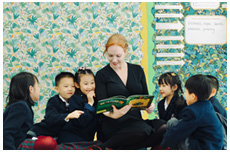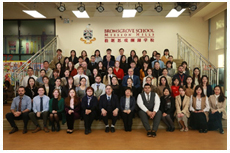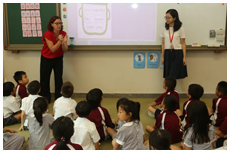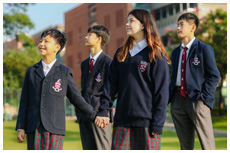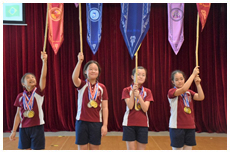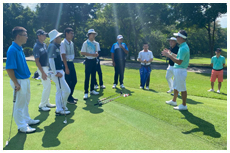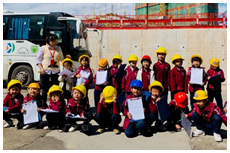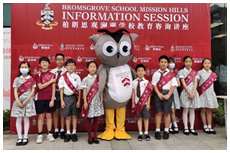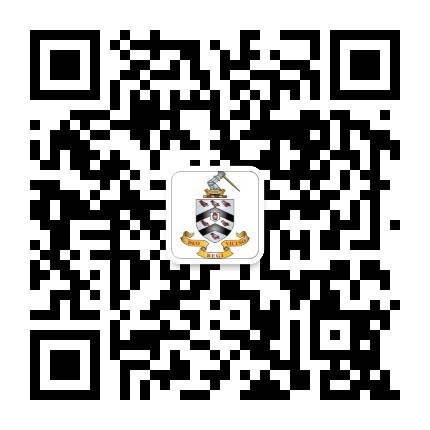China Context / Traditional Virtues
As an internationalised school in Shenzhen, we strongly believe that the inheritance of Chinese culture and traditional virtues should be a fundamental premise of exemplary educational establishments. Integration of the different cultures and ideologies that we uphold and advocate requires children, and indeed all of our stakeholders, to embrace traditional Chinese culture and then integrate into the global community with an open and inclusive heart.
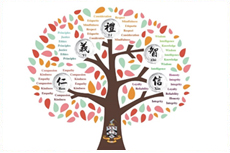
Traditional Virtues (Ren, Yi, Li, Zhi, Xin)
The essence of five-thousand-years of culture of the Chinese nation is richly veined in lessons and ideals regarding proper self-conduct and the core of this thought can be summarised as five virtues: Ren (compassion and kindness), Yi (principles and justice), Li (respect and courtesy), Zhi (intelligence and wisdom), and Xin (integrity and honesty). Since the Han Dynasty, these five virtues have been woven through the fabric and development of Chinese ethics and have become the core of traditional Chinese virtues.
-
Ren (Compassion and Kindness)
Ren is a moral concept with a wide range of meanings in ancient times and it focuses on the close relationship and mutual love between people. Ren is the consciousness of human nature, which is based on the psychology of parent-child love, but higher than parent-child love.
Ren, proposed by Confucianism, is an excellent character possessed by human beings. The Book of Rites says, Ren means mutual kindness, generosity, and consideration between people and the country. Since the time when Confucius advocated Ren, it has become the common moral character of the Chinese nation. Confucius regarded Ren as the highest state of personal moral cultivation, made loving others the fundamental principle of morality, and took the idea that “the world can be the best because of Ren" as the highest social moral ideal. Therefore, Ren has become the traditional cultural philosophy and unique characteristic of the Chinese nation for thousands of years. Like the Book of Rites says, benevolent families make a benevolent country; modest families make a modest country.
Yi (Principles and Justice)Confucius is the one who first proposed Yi, latterly further developed by Mencius. Both Confucius and Mencius regarded Yi as one of the highest moral standards of Confucianism. The combination of Yi and Ren is the representative of morality, which is described in Chinese sayings as “being most perfectly fulfilled both in benevolence and righteousness”.
Nowadays, Yi has become a view of life and values, and manifests noble morality of Chinese people. As Mencius said, "Life is what I desire, and Yi is also what I desire. I cannot obtain both of them, so I sacrifice life for Yi.”
Li (Respect and Courtesy)The initial meaning of Li is to hold a ceremony, worship God for blessing, and show respect to God. In daily life, Li means respect for others, code of conduct and norms of good behaviour.
In traditional Chinese culture, it is believed that Li is a sign that differentiates human beings from animals. To some extent, Chinese ethical culture can be seen as “courtesy culture”. Li is the typical spirit of traditional Chinese culture and the essence of social interaction. Li and Ren are like the exterior and interior sides of things. Being benevolent - loving and caring for others - is the interior spirit of Li while being courteous to respect and compromise is the exterior manifestation of Ren. Being courteous has become the visual representation of a person, a society and a country’s civilization.
Zhi (Intelligence and Wisdom)Zhi means wisdom, intelligence, talent, and strategy. Confucianism regards Zhi as one of the important conditions for realising the highest moral principle Ren, which must go through five steps of “knowing”, namely, erudition, interrogation, deliberation, discernment, and implementation.
Ancient Chinese ideologists endowed Zhi with rich morality and connotation. The key point of Zhi is about knowing when to follow principles. As we all know, people gain knowledge by learning. Ren, Yi, Li and Xin are the basic principles for being a person with proper behaviour, while people need Zhi to combine all of them. Otherwise, even if you possess Ren, Yi, Li and Xin, it is not possible to clearly understand life, one’s place in it and best courses of action to be taken.
Xin (Integrity and Honesty)The original meaning of Xin is being sincere and focused. People's words should be honest, true, and not hypocritical. People will not be trusted by others if they are not faithful. What you see may not be true, so do not talk about it; if you are not fully clear about something, do not spread it. Words can lead to fortune or misfortune. Words can make a country prosperous or destroy a country.
Xin also refers to integrity and trust. Integrity is a conventional norm for social interaction. Be sincere and responsible for your words; treat others with sincerity; obtain others’ trust with sincerity and honesty; one promise is worth a thousand ounces of gold; be honest and trustworthy. All of these traditional virtues have been praised highly and carried forward for thousands of years. Faith is the foundation of being a person, the way of starting a business and governing a country. Keeping promises and being faithful are the values and basic virtues recognised by the Chinese nation.
-
About Us
- Vision / Mission / Values
- Why BMH
- China Context / Traditional Virtues
- About Bromsgrove School
- Message from Board
- Message from Honorary Headmaster
- Message from Leadership
- Teachers' Bios
- Academic Foundations
- Campus Community and Facilities
- The Wider Community
- Community Partners
- Photo and Video Gallery
-
Pre School
-
Prep School
- Curriculum Overview
- The Learning Areas
- Chinese and English Mastery
- Inquiry Approach
- Assessment and Reporting
- Facilities
- Timetable
- Experiential Learning
- Student Ambassadors
Senior School
-
School Life
- Boarding
- The House System
- Holistic Development
- Life Beyond the Classroom
- Physical Education
- Sports Clubs and Teams
- Music
- Theatre & Drama
- Expeditions, Tours and Trips
- Student Voice
- Catering
- Green Monday
- Parent Handbook
- Uniform
- PreSchool Co-Curricular Activities
- Prep School Co-Curricular Activities
Admissions
-
News & Events
Careers
 粤公网安备 44030902001915号 粤ICP备19154933号
粤公网安备 44030902001915号 粤ICP备19154933号


